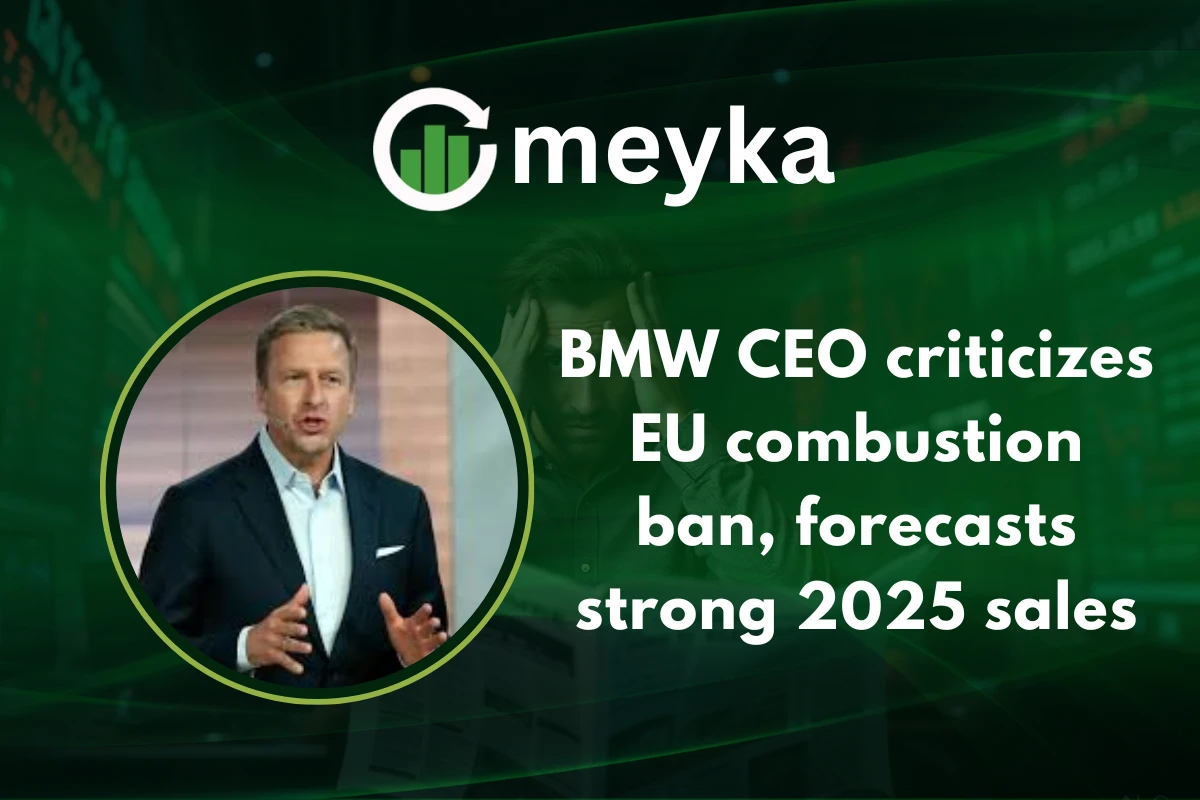BMW CEO Criticizes EU Combustion Ban, Forecasts Strong 2025 Sales
The BMW CEO recently voiced strong concerns about the EU’s planned 2035 combustion engine ban, calling it a “big mistake”. He also projected robust 2025 sales, driven by continued demand for hybrids and electric vehicles. His remarks have stirred debate across the auto industry and energy policy circles.
What prompted these comments, and what do they mean for BMW, consumers, and the wider European car market?
Who Is the BMW CEO and Why Is He Speaking Out?
BMW CEO Oliver Zipse leads one of Europe’s top automakers. He spoke candidly during a recent interview, arguing that the EU’s proposed ban on petrol and diesel engines by 2035 could harm consumer choice and push up costs.
He said that while BMW supports decarbonization, it should occur gradually, allowing hybrids and clean combustion engines to bridge the transition. By expressing this nuanced position, the BMW CEO emphasised both environmental goals and market realities.
What’s the EU Combustion Engine Ban All About?
The European Union plans to outlaw sales of new internal combustion engine vehicles by 2035. This policy intends to accelerate the shift to zero-emission transport.
But critics like the BMW CEO argue this timeline is too aggressive. He warned it could price out middle-income buyers and undercut innovation in hybrid technologies. Zipse suggested a more flexible approach could achieve climate goals without sacrificing affordability or consumer choice.
Why is there such a debate now?
BMW CEO Forecasts Strong 2025 Sales
Despite his criticism, the BMW CEO remains upbeat on the company’s outlook. He predicts strong sales growth in 2025, driven by a diverse product mix.
BMW expects continued demand for hybrid-powered vehicles alongside battery electric models like the iX and i4. Zipse credited recent investments in EV production and global supply chain resilience as the foundation for growth, especially in European and U.S. markets.
What factors support this bullish forecast?
Factors Fueling 2025 Sales Momentum
The BMW CEO outlined several trends working in their favour. First, hybrids are still popular with buyers who want greener cars without range anxiety. Second, fully electric models are gaining traction as charging infrastructure improves.
Third, ongoing control of costs and efficiency gains from new production lines are helping BMW maintain profit margins even on EVs. He said that these factors combined should enable BMW sales to rise even under shifting regulations.
Consumer and Industry Reaction
BMW’s stance has prompted mixed responses. Environmental advocates argue that a faster transition to zero-emission vehicles is needed to meet climate targets. They see the ban as a clear signal to manufacturers.
But auto industry groups and many consumers welcomed the BMW CEO’s comments, saying his call for a balanced transition recognizes market realities. Some governments also hinted they are monitoring the policy to ensure affordability remains a priority.
One tweet captured the moment: “Zipse’s critique shows the auto industry needs time to innovate. Rushed policies could backfire.”
Will BMW Change Its Strategy?
While critical of the EU ban, the BMW CEO reaffirmed BMW’s commitment to electrification. He emphasized the company’s long-term roadmap includes both EV growth and clean combustion advancements.
BMW is already scaling EV output and expanding hybrid lines. They plan to introduce more models that combine efficiency with zero-emission potential. This strategy aims to maintain consumer choice across income levels and reduce environmental impact gradually.
Policy Implications and Market Dynamics
Zipse’s comments signal that manufacturers want policy flexibility. He called for support for hybrid technology and gradual phase-outs, arguing that a hard ban could reduce market competition.
For investors and auto analysts, those remarks indicate BMW expects hybrid demand to persist into mid next decade. This shapes forecasts for vehicle registrations, dealer inventory, and resale value of various powertrain types.
Will regulators take notice and adjust timelines?
Expert Perspective on BMW CEO’s Remarks
Industry analysts say the BMW CEO raised valid points about affordability and technology readiness. They note that hybrids serve as a bridge in markets where full EV adoption may be slow.
Auto market experts add that an abrupt combustion ban could create supply gaps and consumer backlash. By calling out these risks, BMW may be pursuing a policy outcome that balances innovation with market stability and profitability.
Risks and Counterpoints
BMW’s position is not without controversy. Critics argue that full EV adoption is critical to meet EU climate targets. They say hybrids extend reliance on fossil fuels and slow emissions reductions.
Zipse’s remarks could be seen as protecting legacy markets. Analysts caution that the longer manufacturers delay EV-only transitions, the more risk there is of falling behind in global electric leadership.
Conclusion: What Lies Ahead for BMW CEO Strategy
The BMW CEO has boldly called the EU combustion ban a misstep while forecasting strong 2025 sales across powertrain types. His message blends market strategy with climate pragmatism.
BMW plans to push ahead with both hybrid and electric models. Meanwhile, regulators may need to weigh financial realities alongside environmental goals.
As EU climate policy evolves, watchers should track:
- BMW’s quarterly sales figures
- Policy updates on combustion engine bans
- Market adoption patterns for hybrid and EV models
In the end, the BMW CEO’s views could shape both industry standards and consumer options for years to come.
FAQ’S
He believes the 2035 ban is too strict and could reduce consumer choice and affordability.
He predicted strong growth in 2025, driven by hybrids and electric vehicle demand.
Yes, he supports EVs but also wants hybrids and cleaner combustion engines to play a role in the transition.
He said it could raise costs for buyers and limit access to affordable vehicles.
BMW will expand EV production while continuing to invest in hybrid technologies to balance consumer needs.
Disclaimer
This content is for informational purposes only and is not financial advice. Always conduct your research.






